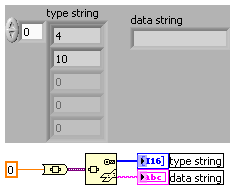- Subscribe to RSS Feed
- Mark Topic as New
- Mark Topic as Read
- Float this Topic for Current User
- Bookmark
- Subscribe
- Mute
- Printer Friendly Page
Variant to String problem
04-17-2008 12:00 AM
- Mark as New
- Bookmark
- Subscribe
- Mute
- Subscribe to RSS Feed
- Permalink
- Report to a Moderator
Ravens Fan wrote:
I'm glad you got it figured out.With your later descriptions, what you are doing makes more sense than the way I was interpreting the original post.
Out of curiosity, which LV version are you using? What is the function in your picture that looks like a piece of paper and has the file path going into it? I hadn't seen that one before. Is it a LV subVI or a subVI you made? I'm wondering if it is an older version of a config file VI.
04-17-2008 12:04 AM
- Mark as New
- Bookmark
- Subscribe
- Mute
- Subscribe to RSS Feed
- Permalink
- Report to a Moderator
smercurio_fc wrote:
You might be able to glean the datatype information using the Variant to Flattened String function and looking at the type string output. The information is based on LabVIEW 7, but it might work.
Hi Smercurio,
I did try that one too. It didn't work. The result was that string coming out was empty. ![]()
Mika
04-17-2008 12:21 AM
- Mark as New
- Bookmark
- Subscribe
- Mute
- Subscribe to RSS Feed
- Permalink
- Report to a Moderator
Wiebe@CARYA wrote:
Mika,
You need to convert it to the correct data type. This is a bit problematic,
since you might not now the type. You need to convert the variant to string,
if that results in an error, convert it to int, if error, try boolean, etc
(order is arbitrary, put the most used first for speed).
Unfortunatelly, there is still no way to get the string displayed in the
variant control in LabVIEW... Perhaps there are some OpenG tools, or perhaps
something on LAVA... I'd give it a shot before trying it myself. If you're
lucky, you might even find some "variant to ini file" functions.
Regards,
Wiebe.
04-17-2008 09:06 AM - edited 04-17-2008 09:07 AM
- Mark as New
- Bookmark
- Subscribe
- Mute
- Subscribe to RSS Feed
- Permalink
- Report to a Moderator
Hi Smercurio,The type string output is the array of integers, not the string output, which is data string.I did try that one too. It didn't work. The result was that string coming out was empty.


Message Edited by smercurio_fc on 04-17-2008 09:07 AM
04-18-2008 01:30 AM
- Mark as New
- Bookmark
- Subscribe
- Mute
- Subscribe to RSS Feed
- Permalink
- Report to a Moderator
smercurio_fc wrote:
Hi Smercurio,The type string output is the array of integers, not the string output, which is data string.I did try that one too. It didn't work. The result was that string coming out was empty.

Message Edited by smercurio_fc on 04-17-2008 09:07 AM
Hi again,
I connected my variant that way. Type string has values 4 and 3, no matter what data type the variable is. I tried that with boolean,double and string variables.
Mika
04-18-2008 03:40 AM
- Mark as New
- Bookmark
- Subscribe
- Mute
- Subscribe to RSS Feed
- Permalink
- Report to a Moderator
can simply use a case to parse the variant to the known type. In the same
case convert the type to string. Put it in a VI that has a variant input
(and a type hint), and a string output.
I'm not sure if there is an OpenG package to do this. But if someone made
something like this, you'll find it on LAVA or OpenG.
Regards,
Wiebe.
04-18-2008 05:14 AM
- Mark as New
- Bookmark
- Subscribe
- Mute
- Subscribe to RSS Feed
- Permalink
- Report to a Moderator
Would the "Get Variant Attribute" Function return what you need? I think one of the attributes encoded is the original data type? I have never used it, so I may be way off base.....
I see it in 8.5, don't know if it is in earlier versions.....
04-18-2008 07:25 AM - edited 04-18-2008 07:25 AM
- Mark as New
- Bookmark
- Subscribe
- Mute
- Subscribe to RSS Feed
- Permalink
- Report to a Moderator

To get some debugging info about variant data have a look at the Variant Browser.
Variant attributes can be used for this, you should write the datatype to an attribute with a clear name eg. 'Datatype'.
Ton
Message Edited by TonP on 04-18-2008 02:25 PM
Nederlandse
My LabVIEW Ideas
LabVIEW, programming like it should be!
04-18-2008 09:02 AM - edited 04-18-2008 09:02 AM
- Mark as New
- Bookmark
- Subscribe
- Mute
- Subscribe to RSS Feed
- Permalink
- Report to a Moderator
In fact, if you look at the block diagram, you will see it's using the ... Variant to Flattened String function.

That VI in the middle is just parsing the array to get an enumeration.
Message Edited by smercurio_fc on 04-18-2008 09:02 AM
04-18-2008 11:03 AM
- Mark as New
- Bookmark
- Subscribe
- Mute
- Subscribe to RSS Feed
- Permalink
- Report to a Moderator
@KevMi wrote:I tried to find that toolkit that could be useful in OpenG pages. I couldn't manage. Somehow I feel search-function is a bit clumsy at OpenG pages.Mika
Hello Mika,
Yes, the search capabilities and organization on the OpenG site could certainly be improved.
I think that you might be interested in the OpenG LabVIEW Data Tools library. It contains VIs for inspecting and operating on variants, type descriptors, and flattened data.
Cheers,
-Jim
- Tags:
- OpenG
